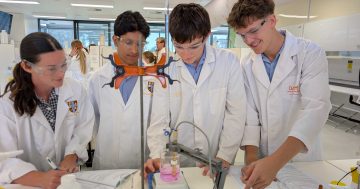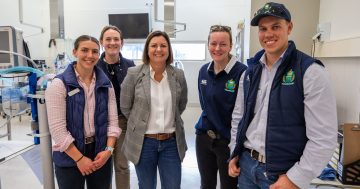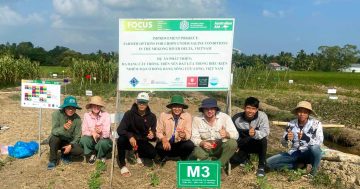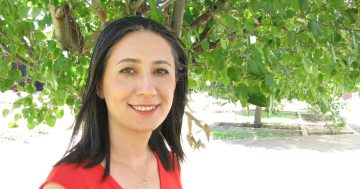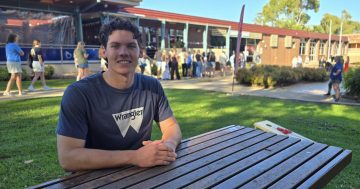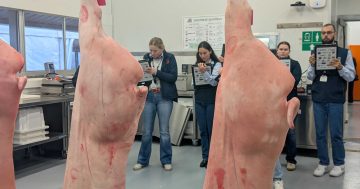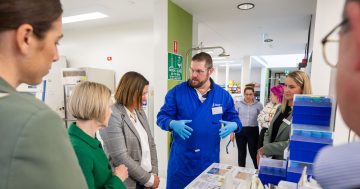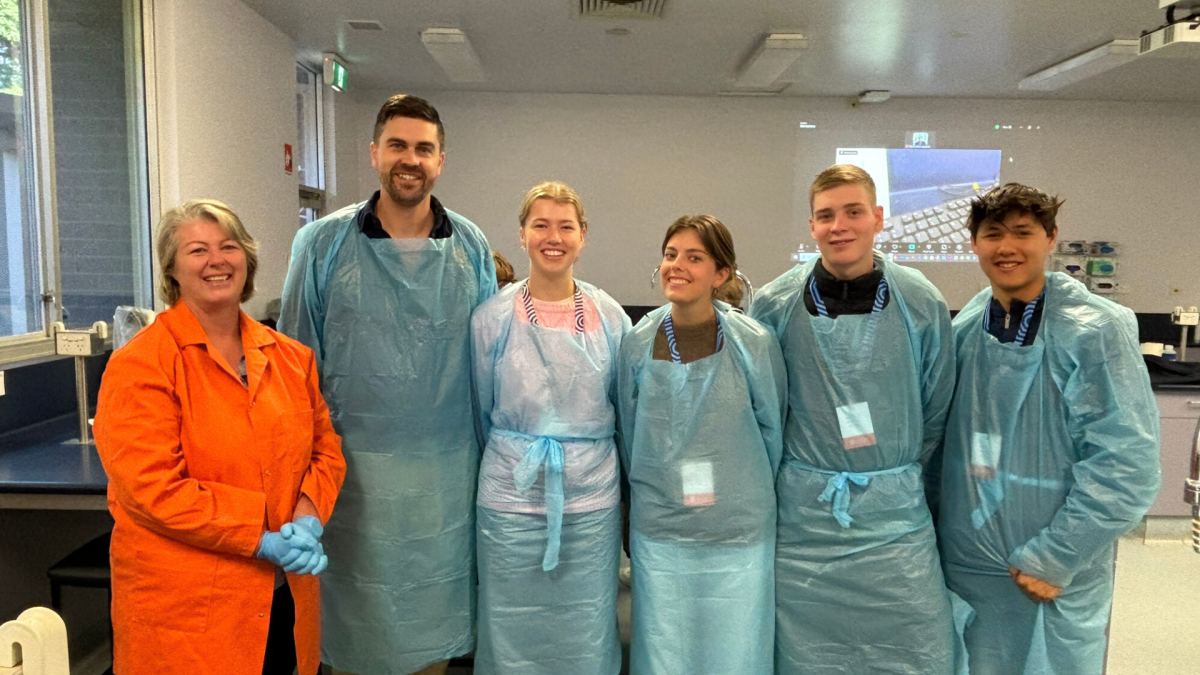
Course director and lecturer in veterinary practice Dr Michelle Eastwood, head of agriculture at Barker College Mr Scott Graham and Barker College students Annabel Cameron, Lily Elder, Simon Greager and William Bohlsen. Photo: Charles Sturt University.
The presumption that only children who come from farms pursue a career in agriculture is being dismantled by a Sydney school.
Almost 100 HSC agriculture students from Barker College in Sydney visited Charles Sturt University’s (CSU) agriculture, animal, and veterinary science facilities in Wagga Wagga recently to learn more about their higher education and career options after school.
Associate head of CSU’s School of Agriculture, Environment and Veterinary Sciences, Dr Jeff McCormick said the teachers at Barker College were doing something different.
“The head teacher of agriculture at Barker College, Scott Graham, was awarded the Prime Minister’s Science Award and he and his colleagues have changed the way that agriculture is displayed within the school,” Dr McCormick said.
“Their student body is predominantly from urban Sydney, so they have little agricultural experience.
“They’ve transformed that subject into an applied biology, so it’s like a science subject in that sense, but with a real application in production and agriculture.
“They’ve taken things that those students know and are familiar with — products — and really looked at a paddock-to-plate process for those things.”
Students spent a day at CSU and rotated between three workshops that included a sheep digestive tract dissection, a ‘Pit Talk at the Charles Sturt Soil Pit’, and a session on ‘The Future of Agriculture Through Data and Technology’.
Other acitivities included visiting the university’s Red Meat Innovation Centre and participating in a pasture assessment.
It was Barker College students’ first visit to CSU, which was initiated following the Agricultural Teachers Professional Development Conference in Wagga in October 2024.
Mr Graham said the visit to CSU was a great opportunity for students to see where agriculture was heading and what they could contribute.
“We are excited to visit the Charles Sturt Wagga Wagga campus with 94 of our Year 12 agriculture students to let them experience what university life and an agriculture degree look like,” he said.
“Wagga Wagga offers the perfect place for students to understand what career opportunities there are in the agriculture sector, both on and off farm.”
Dr McCormick said the students expressed their interest in pursuing tertiary education at CSU.
“We’ll wait to see what the numbers bring next year, but we’re probably a little broader than just agriculture as well,” he said.
“We offer animal science, veterinary science, and veterinary technology, as well as a range of agricultural degrees.
“Their eyes were opened to what we can do here, and I guess how accessible it is for them, because obviously, most of them are based in northern Sydney, but now that they’ve been here, it opens the door for them to come back as students in the future.”
Dr McCormick said agriculture was more than farming.
“There’s often been an assumption that you’ll get kids who come from farms and they’re the only ones interested in it — and that they’ll be going back to farms to drive tractors and work stock,” he said.
“But many more jobs, both pre- and post-farm, are available in agriculture.
“Whether it’s people providing advice, doing research, providing funding through banks, writing policy, or working in agribusiness — buying products, selling, exporting — there’s a range of different roles within the agricultural industry that aren’t just directly based on farming.”
Dr McCormick said the agriculture industry needed more staff.
“They’ll be coming out of urban environments in the future, so we need to make agriculture accessible to a wider part of the population.”
Professor Hayley Randle, head of CSU’s School of Agricultural, Environmental, and Veterinary Sciences in Wagga Wagga, said the university was committed to supporting HSC students in continuing their studies beyond secondary school.
“Charles Sturt University is committed to working with schools to address the Australian agricultural workforce shortage and increase skilled professionals in the industry,” she said.
“We want to partner with schools to address the current myth that agriculture is only farming and to show prospective students that it is a dynamic and rewarding career option.”
Professor Randle said immersive and practical programs aligned with the syllabus aimed to inspire and encourage more students to enter the agricultural sector.







